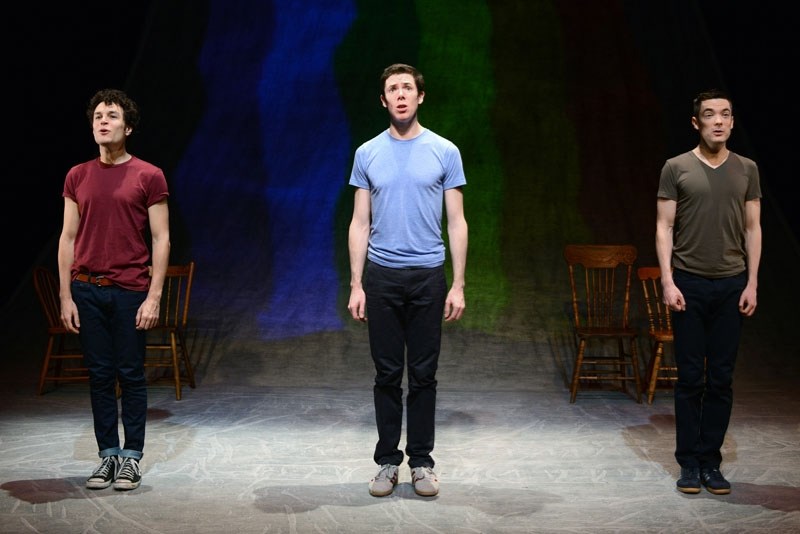A trio of Canada’s most consummate performers went on a five-year voyage of discovery to unearth their heritage.
To most of us the word “heritage” refers to bloodline, race, culture, religion or even a region. To actor/creators Damien Atkins, Paul Dunn and Andrew Kushnir “heritage” took on a new meaning in their explorations to make more connections to queer culture.
In the trio’s research, they unearthed a rich and in some cases a deliberately forgotten queer history that illuminates new facets of gay culture.
The result of their hard work is The Gay Heritage Project, a cocktail of anecdotes, secret stories and family narratives that is touching and inspiring. The three-man show is on a seven-week tour that includes the Citadel Theatre from Feb. 10 to 27.
“Heritage for us is a verb. It encompasses not only past history, but the present and future. What makes the community and what are we living for,” said Atkins. Although the trio resides in Toronto, they have a strong Capital Region connection.
Atkins is a former St. Albert Children’s Theatre alumnus and Dunn is from Sherwood Park. Both attended Grant MacEwan College and Kushnir travelled to Edmonton to study at the University of Alberta.
Any number of inspirations can galvanize an artist. For Dunn it was reading the disturbing account of The Men With the Pink Triangle by Heinz Heger. It was a gripping personal account of horrific persecutions that took place against homosexuals in Germany during the Second World War.
Homosexuals imprisoned in camps received the same ghastly treatment as Jews, and in some cases worse. But because homosexuality was considered a crime in Germany and was illegal in many other countries, few prisoners shared their stories. Over time, narratives were lost.
“It was so traumatic for him. He was so ashamed he didn’t know about this part of history and he felt a real link to it,” Akins said.
But there was another layer to it that goes unnoticed by those not marginalized.
“Sometimes being queer can be a lonely thing. That’s part of the reason we went looking for connections. The thing about being queer is that it transcends ethnicity, age, language, gender. But it’s not so easy to locate them. One way to be connected is to find your heritage. It helps you feel less alone.”
Dunn introduced the idea to his creative partners and the trio was spurred into action. After conducting intensive research and discussion, they decided to construct their stories using vocal masque.
In vocal masque, most scenes are solo performance with the actor playing all the characters.
“It’s hard for the actor, but it’s magic when it gets going.”
The Dora Mavor nominated play premiered in Toronto in 2013 at Buddies in Bad Times Theatre. However, a major overhaul was conducted for the tour.
“No entire scenes were cut, but they received rewrites and more depth,” said Atkins.
But the intent remains the same.
“So much is about honouring the mentors we had and about our lives as queer people built on the hard work of thousands who came before us.
Preview
The Gay Heritage Project<br />Feb. 10 to 27<br />Citadel Theatre<br />9828 – 101A Ave.<br />Tickets: $31.50 to $90 Call 780-425-1820 or online at citadeltheatre.com




